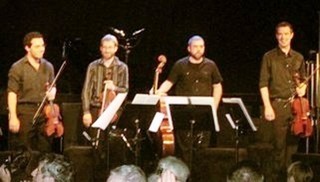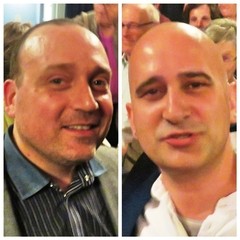|
Back
Revelations And Opacities New York
92nd Street Y, Buttenwieser Hall
05/23/2016 -
Cenk Ergün: Sonare – Celare (New York premieres)
Derek Bermel: Intonations (World premiere)
Marc Sabat: Euler Spirals, Scenery (New York premiere)
JACK Quartet: Christopher Otto, Ari Streisfeld (Violins), John Pickford Richards (Viola), Kevin McFarland (Cello)

JACK Quartet (© Samuel A. Dog)
”Uncompromising.”
Alan Gilbert, describing NY Phil Biennial Opening Night.
And uncompromising is exactly what a Biennial should be. Those who want an 1812 Overture were obviously going to the wrong place. Last night was the opening, with those icons of contemporary music, the JACK Quartet. Their four works played havoc with time, space, music and ideas. Each in totally different ways.
For these premieres (both World and New York) writers like myself without a score couldn’t be quite so uncompromising. We had to give a facsimile of the music and the players.
The latter is easy. The JACK Quartet can do everything. And one takes their astonishing performance almost for granted. But listening to this trio of composers, from Canada, Turkey and the United States, one must do some processing–even some translating–from the ear to the mind.
Composers’ descriptions don’t have to be transparent (they work in music, not words), but sometimes, the verbal opaqueness blurs the pleasure (and I use that word in the widest sense).
Mark Sabat’s Euler Spirals, Scenery was the obvious case. The title (he writes) “refers to Leonhard Euler’s two-dimensional model of triadic harmonic space.” Fine...I guess. From here, though, he plunges deeper into the cave. “A portion of his lattice, comprising 99 distinct pitch-classes organized as a progression of major and minor triads in Just Intonation...”
And that was just the beginning. The rest is, to uneducated peasants like myself was gibberish.
I took the easy way out. The long long long microtonic melodies, with the open strings, and harmonics, had the harmonies of, er, a lugubrious square dance. Not understanding “a written-out tuning sequence testing comma distinctions and partial unisons...”, I was delighted by the JACK Quartet portraying an LSD-hallucinations of four Gargantuans lumbering through a “dark fantastic.”
The other three movements, devoted to Euler, Pythogoras and two composers new to me, were easier to decipher. This was obviously Ars Antiqua, music of the 12th and 13th centuries, arranged freely by Webern and Feldman, a gyroscopic time trip embracing ancient tropes and present-day concepts.
With apologies to Mr. Sabat, this was the only way I could get through it. Though apparently the full house in the 92nd St.Y last night, understood completely since they sat through the 30 minutes with an unsmiling stolidity akin to adoration.

D. Bermel/C. Ergün at 92St.Y (© Samuel A. Dog)
Cenk Ergün’s music was partly arcane, partly delightful. Mainly, though, although a product of the Ottoman Empire, his musical philosophy was decidedly Byzantine. In the program was an inserted painting, looking like a pared-down Míro, which he felt was a commentary on music “which tries to do everything...and nothing.”
The “nothing” was Celare, coming obviously from the Latin Ars est celare artem (it is an art to conceal art). In this, Mr. Ergün was on target. The 17-odd minutes of space and microtones and more space and interval resembled those 1950’s Cage-emulaters who successfully concealed their art through ersatz philosophical rationales embracing Marxist Nihilism and Wittgensteinian algorithms.
Possibly, I imagined, these were the sounds in a Cheddar-cheese factory with slow intermittent churning of whey and curds.
Mr. Ergün’s second work, Sonare was far more fun. This was the JACK Quartet doing an update of Honegger’s Pacific 231, with all four strings buzzing merrily along with quarter-tone oscillations, all on one note, fingers between bridge and tailpiece, giving a fiercely metallic sound.
The sounds obviously came from a supersonic train, if a mike was held between the train and the rails. The volumes went up and down, the oscillations and fluctuations were endless (actually ten minutes) and the energy made the ears and mind soar.
Derek Bermel’s Intonations was described with words that finally meant something, inspired by Ralph Ellison’s The Invisible Man, one of America’s most important novels. Here, Mr. Bermel, who has written with the most eclectic ensembles, gave us a work with stunning and actually moving music.
The first movement was called Harmonica, but its wheezing in and out could have been accordion as well. The dynamics were as tricky as the sound. But the first notes could well have come from a Beethoven late string quartet–and within seconds, the “Beethoven” had segued into blues.
Not synthetic-blues or blues-quotations but Muddy Waters blues as imagined by Beethoven himself. This was followed by Hymn/Homily, equally bluesy but thick dense harmonies, partly Mississippi swampy and partly a Jerome Kern-style Showboat African-American music by a student of Schoenberg.
The final Hustle was a crazy rondo, the main theme seeming to be a workmen’s chant, which could have come from the Delta or the Volga. (“Pick-a-them cotton bolls, Have-a sip of Vodka...”) followed by equally inventive intervals.
It was a brilliant piece, since it actually moved. The Invisible Man was the metaphysical inspiration. But Ellison had written the most probing essays on jazz. Mr. Bermel understood this, and he also understood that even the most ‘uncompromising” music must be more than impenetrable. Paths may be concealed, but with effort from composer, performer and audience, their disclosures may sometimes contain the seed of revelation.
CODA: The 2016 NY Phil Biennial continues through mid-June and the programs are far too variagated to be listed here. So I urge you to visit http://nyphil.org/biennial
Harry Rolnick
|